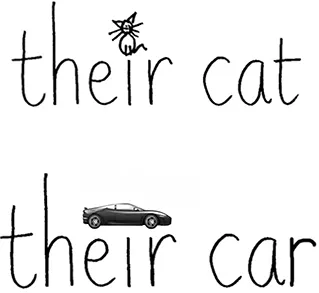
Spelling Rules, Riddles and Remedies
Advice and Activities to Enhance Spelling Achievement for All
Sally Raymond
- 174 páginas
- English
- ePUB (apto para móviles)
- Disponible en iOS y Android
Spelling Rules, Riddles and Remedies
Advice and Activities to Enhance Spelling Achievement for All
Sally Raymond
Información del libro
Spelling Rules, Riddles and Remedies is for anyone supporting learners who are struggling to understand the world of English spellings.
This book engages learners and enhances their learning by using practical and dynamic resources to reveal the cause and effect of spelling confusions. By posing opportunities for understanding memory-related applications, learners and their spelling tutors are empowered with the knowledge and resources required to amend, improve and proliferate spelling success.
In this revised edition, bestselling author Sally Raymond offers further unique and accessible 'Spelling Detective' and 'Learning Application' activities and explores ways of empowering individual learners. Offering a wealth of effective approaches to improving spelling, chapters:
-
- demonstrate how spelling errors can be examined to develop solutions for individual learners;
-
- show how to engage pupils through use of meta-cognition;
-
- highlight the reasons why spelling abilities might fail;
-
- explore and resolve the impact of English spelling irregularities and deviations through informed discovery;
-
- illustrate how to use mnemonics and story-lines to link tangible prompts to confident spelling ability;
-
- provide structured game-play and challenging practice lessons.
-
- boost pupils' achievement through the strategic use of multiple processing skills.
Clearly presented and highly illustrated, this book encourages creativity and shows teachers how to adopt and adapt a variety of learning strategies to suit different needs. Targeting learners in Key Stage 2 upwards, Spelling Rules, Riddles and Remedies brings a wealth of ideas to stimulate spelling success.
Preguntas frecuentes
Información
Chapter One:
Varied and Innovative Learning Opportunities
Creating a spelling prompt for ‘SAID’
snow and ice day | This spelling prompt is not effective because it is too bland.It does not relate to the word ‘said’ so it is unlikely to be triggered when the word ‘said’ is needed in mainstream writing. |
Sally Anne is dancing | This spelling prompt is more interesting, particularly if the learner likes dancing.HOWEVER, it lacks drama, and also lacks any relation to the meaning of the word ‘said’ reducing its ability to be triggered when using the word in mainstream writing. |
Sally Anne is dead, said the vet.  Turn to page 31 to see how to practise this spelling prompt | This spelling prompt attracts attention due to the drama of something being dead (toned down by the report being made by a vet).The two capital letters (S and A) have the potential to impact on the spelling, of ‘said’, but don’t appear to do so. The learner is involved with their learning and aware that the prompt is there to help trigger their spelling memory. The engagement of their thinking skills probably accounts for the brain’s ability to use lower-case letters when writing ‘said’. Learners should draw their own picture to increase the strength of neurological pathways to and from long-term memory. |
Creating a spelling prompt for ‘THEIR’
| Their hamster eats iced rings | This spelling prompt contains the key word, helping to trigger its recall at the point of writing ‘their’ in mainstream text.It also uses the word in a sentence that helps identify the use of ‘their’ (rather than ‘there’ or ‘they’re’), reducing confusion between these homophones. HOWEVER, it is relying on a lengthy mnemonic where every letter of the spelling is contained in the phrase. For some, this may be necessary, but for many, all they need is a reminder of which ‘their/there/they’re’ to use when referring to ownership. |
 | This spelling prompt achieves the same effect as the one above, but in a more concise fashion.It also demonstrates how helpful it can be to (a) avoid the necessity to create mnemonics for every spelling, and (b) identify where the spelling mistake is commonly made, and focus the memory prompt just at that point. Learners should copy this prompt to add visual and muscular activities to their memory pathways, adapting it to suit their individual interests. (For example, choosing a drawing that depicts ‘their bike’, or ‘their dog’ instead.) |
 | Identifying the spelling of ‘there’ by asking “Is it here, there or everywhere?” helps provide a memory prompt for other spellings too. |
They are playing volley ball, and they’re losing!  | Often, learners do not realise that ‘they’re’ is a contraction of ‘they are’ as the latter is not used in speech as often as it used to be. Shifting the focus of spelling to meaning (rather than sound) can be very helpful to a novice speller, especially when faced with multiple spelling choices. |
Creating a spelling prompt for ‘WHAT’
What help are toes? | This spelling prompt contains the key word, helping to trigger its recall at the point of writing ‘what’ in mainstream text. HOWEVER, it is an example of how the challenge of creating a mnemonic out of the letters available has resulted in a prompt that lacks interest and is easy to forget. |
 What an amazing hat! | For this prompt, FIRST ask the learner(s) to draw a hat of their own invention which you will be able to look at and say “What an amazing hat!” Once this is done, write the word ‘what’ and ask them what the connection is between the picture they have drawn, your expression of “What an amazing hat!” and the spelling of the word ‘what’. This spelling prompt is created by guiding the learner through a process which reveals purpose and discovery. For the learner to identify for themselves the appearance of ‘hat’ within the word ‘what’ is far more effective than for them to be told this by someone else. |
| When the hen … | Having introduced ‘what’, then encourage the learner(s) to decide how to apply the same idea to the spelling of ‘when’. Remember that the prompt must link to the meaning of the word so you would expect their memory prompt to begin:
|